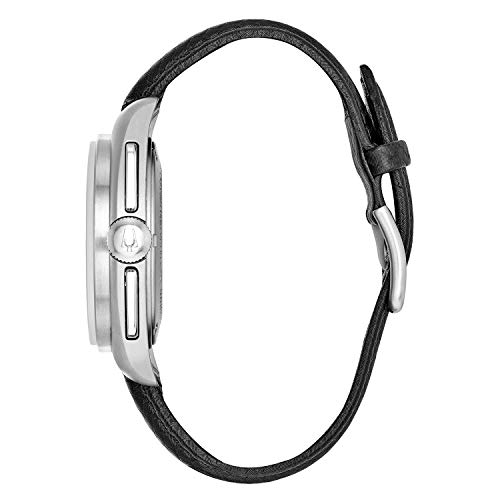All Categories












Bulova Men's Archive Series Lunar Pilot 6-Hand Chronograph High Performance Quartz Stainless Steel and Black Nylon Strap Watch Set, Sapphire Crystal Style: 96B251
Share Tweet
Get it between 2025-07-29 to 2025-08-05. Additional 3 business days for provincial shipping.
*Price and Stocks may change without prior notice
*Packaging of actual item may differ from photo shown
- Electrical items MAY be 110 volts.
- 7 Day Return Policy
- All products are genuine and original








Bulova Men's Archive Series Lunar Pilot 6-Hand Features
-
From the Bulova Archive Series, The Lunar Pilot made space history on August 2, 1971--during the Apollo 15 mission, a moon pilot chronograph was worn on the moon.
-
6 Hand, Chronograph, High Performance Quartz
-
Silver-Tone Stainless Steel
-
Sapphire Crystal
-
50M Water Resistant and 3 Year Limited Warranty
About Bulova Men's Archive Series Lunar Pilot 6-Hand
Description Product Description Bulova made space history on August 2, 1971--during the Apollo 15 mission, a moon pilot chronograph, customized for lunar conditions by Bulova engineers, was worn on the moon. Now Bulova makes history again with the special edition Lunar Pilot Chronograph, updated with our exclusive high performance quartz movement with a frequency of 262 kHz for unparalleled accuracy, continuing a history of precision timing. The "Bulova" Story From the Precisionist Collection. Featuring Bulova’s proprietary Precisionist accuracy, this advanced chronograph offers 1/1,000-second precision over a twelve-hour time frame, with accuracy to within seconds a year. In stainless steel with curved crystal, multiple-layer black carbon fiber, blue, silver and black dial, chronograph measurement of hours, minutes, seconds, 1/10-seconds, 1/100-seconds and 1/1,000-seconds, yellow continuously sweeping second hand, luminous hour and minute hands, luminous markers, tachymeter, calendar, screw-back case, screw-down crown, double-press fold-over clasp with safety lock, and water resistance to 300 meters. Providing an extraordinary level of timing accuracy, the Bulova Precisionist Chronograph is the only chronograph to combine stopwatch timing to 1/1,000-second with Bulova’s exclusive Precisionist-class torsional resonator movement, proven in laboratory testing to be one of the world’s most accurate. Easy and logical to read, each style features four subdials to display the cumulative time at a single glance, with individual measurements on the combined 1/10- and 1/100-second counter, as well as the hour and minute dials, dual-duty floating second hand, and a distinctive 1/1,000-second track with retrograde indicator. Precisionist Technology At the heart of the watch is the Bulova Precisionist-class torsional resonator movement, custom-engineered to provide accuracy to within seconds a year using a three-prong quartz crystal that creates a vibration frequency of 262.144 kHz, the highest of any watch in the world and far greater than that of a standard quartz crystal. In laboratory testing, the Precisionist-class movement has been shown to be three times more accurate than standard quartz. This proprietary manufactured movement, including the signature floating second hand, also offers a resistance to gravitational error that makes it superior in performance to any mechanical watch on the market. Summary of Features Precision timing to 1/1,000th of a second 12-hour chronograph function One of the world’s most accurate movements – accurate to within seconds a year Precisionist-class torsional resonator movement proven in laboratory testing to be three times more accurate than standard quartz Stainless steel case and bracelet Curved mineral crystal Multiple-layer black carbon fiber, blue and silver dial Yellow continuously sweeping second hand Luminous hour and minute hands Luminous markers Calendar window Tachymeter Screw-back Screw-down crown Water resistant to 300 meters About Bulova In 1875, Joseph Bulova, a 23-year-old immigrant, set up shop in New York City and a legendary American watch brand was born. Since then, Bulova has stood proudly in the vanguard of timekeeping innovation, committed to the legacy of creativity and excellence established by its founder. A pioneering force in the industry, Bulova transformed how watches were worn and how time was perceived, registering over 50 patents as he and his company built a record of creativity including the first full lines of men’s (1919) and ladies’ (1924) wristwatches, the first clock/radio (1928) and the first electric clock (1931). To ensure the utmost in precision, in 1920, Bulova even established its own observatory – located atop its New York skyscraper. With that same spirit of innovation, following World War II, determined “to serve those who served us,” Bulova established The Bulova School of Watchmaking, using new and unique methods to train disabled veterans for positions in the watch and jewelry industry. Then, in 1960, Bulova changed timekeeping forever with the revolutionary Accutron, the world’s first fully electronic watch. An integral component of U.S. space technology, Accutron timing was used on 46 NASA missions, including Apollo XI, the first lunar landing (1969). Today, as one of the world’s most recognized brands, Bulova has expanded across the globe, with four separate watch brands, Bulova, Bulova AccuSwiss, Bulova Accutron II and Caravelle New York, as well as the award-winning Bulova Clocks. The signature Bulova brand provides an extensive selection of watches for every occasion, crafted of the finest materials, including 315L surgical grade stainless steel, diamonds, mother-of-pearl, carbon fiber, top-quality leather and Bulova’s proprietary Duramic nylon/ceramic composite, and powered by Precisionist-class quartz, automatic and quartz movements. An industry leader in diamond watch styling, with the new Diamond Gallery offering ex
























